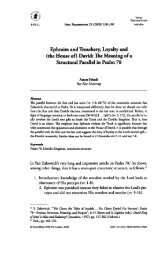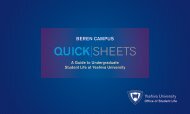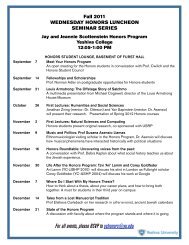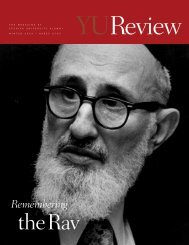32<strong>Richard</strong> C. <strong>Steiner</strong>saying “from this Yom Kippur to (next) Yom Kippur,coming upon us—all of them I shall/hereby regret,” 107 and(that) he wrote that that is the true (version), and (that) hewho says “from last Yom Kippur” is committing anerror....Here, too, the word for “regret” is expressed by a participle, but inthis case the stem of the participle is itpaʿal rather than qal.In short, it seems that the prospective reading of <strong>Kol</strong> <strong>Nidre</strong> gaveאִ יחָ רַ ט (1) :אִ תְ חָ רַ טְ נָא/אִ יחָ רַ טְ נָא rise to three different emendations ofדְּ אִ י־חָ רִ (י)מִ תְ חָ רַ.(מִ שְׁ תְּ בַ עְ נָא to אִ שְׁ תְּ בַ עְ נָא emendation of(attributed to Rashi), (2) טְ נָא (attributed to Rabbenu Meir),and (3) טְ נָא (attributed to Rabbenu Tam, by analogy with his4. Why Singular Participles?The emendations attributed to Rabbenu Tam raise several questions.Why did he not emend the perfects דַ רְ נָא) ,נְ , etc.) toimperfects נִ שְׁ תְּ בַ ע ,נִ נְ דַּ ר) etc.)? And even if he had some reason toנָדַ רְ נָא) prefer participles, why did he decide to use singular participles“I shall vow,” מִ שְׁ תְּ בַ עְ נָא “I shall swear,” etc.) instead of the expectedplural participles נָדְ רִ ינַן) “we shall vow,” מִ שְׁ תַּ בְ עִ ינַן “we shall swear,”etc.)? One obvious answer to both questions is phonetic. He may havewanted the emended verb forms to sound as much as possible like thetraditional forms of <strong>Kol</strong> <strong>Nidre</strong>. The change fromto דִּ י נָדַ רְ נָא וְ דִ י מִ שְׁ תְּ בַ עְ נָא involves only the first vowel or the firstconsonant of each verb and, hence, is far less acoustically salient thana change to דִּ י נָדְ רִ ינַן וְ דִ י מִ שְׁ תַּ בְ עִ ינַן would be. But why would RabbenuTam have wanted the emended forms to sound like the traditionalones? One possibility is that he felt that such a minimal change wouldbe less likely to provoke controversy. Another possibility, perhapsmore likely given what we know of Rabbenu Tam, is that he believedthat the oral reading tradition of <strong>Kol</strong> <strong>Nidre</strong> had become corruptedbefore his time through auditory errors (Hörfehler); hence, inattempting to reconstruct the original verb forms, he was obligated toassume that they sounded like the corrupt forms current in his time. 108אִ שְׁ תְּ בַ עְ נָ אדִּ י נְ דַ רְ נָא וְ דִ י אִ שְׁ תְּ בַ עְ נָא107The participle מתחרטנא may refer either to future ab initio regret or, as B.Septimus suggests (oral communication), to a present declaration of regret (cf.Abudarham at n. 98 above).108I owe this second explanation to B. Septimus, who notes that Rabbenu Tamdid not shy away from controversy.http://www.biu.ac.il/JS/JSIJ/12-2013/<strong>Steiner</strong>.pdf
<strong>Kol</strong> <strong>Nidre</strong>: Past, Present and Future33A second possible reason for the change from plural to singular ishalakhic. According to R. Mordecai Jaffe, <strong>Kol</strong> <strong>Nidre</strong> is not legallyeffective in the plural:וכבר אמרנו שאין אחד יכול להתנות בעד חבירו וא"כ מה שאומרלבסוף לשונות של רבים אינו עושה כלום ואפי' תנאי של עצמו לאאמר ולא התנה כלום לא הש"ץ ולא הקהל.109And we have already said that a person cannot make acondition on behalf of his fellow, and if so, (a person)using plural expressions at the end (of <strong>Kol</strong> <strong>Nidre</strong>) does notaccomplish anything—he has not even stated his owncondition. He has made no condition at all, whether he isthe cantor or a member of the congregation.This claim has been disputed, 110 but even if it is exaggerated, it maycontain a kernel of truth. Rabbenu Tam himself tells us that hisfather’s revision of <strong>Kol</strong> <strong>Nidre</strong> was inspired in part by the talmudicכל נדרים שאני עתיד לנדור יהו בטלין above: formula in Ned. 23b cited“all vows that I may make shall be void.” 111 Since that formula is inthe first person singular, it is possible that Rabbenu Tam believed thatthe original, uncorrupted version of <strong>Kol</strong> <strong>Nidre</strong> was also in the firstperson singular.5. Dubious Grammatical Assumptions in Later TimesWe have seen that Rabbenu Tam or his father changed the verbs of<strong>Kol</strong> <strong>Nidre</strong> from perfects to participles. Many later halakhists acceptedthis idea in principle but had their own ideas about how to put it intopractice.One dubious idea that eventually took root was that masculinesingular Aramaic participles with enclitic נא - always have ḥireqpreceding the last consonant of the root—even if that consonant isresh or ʿayin. Already in printed editions of the 16th century, we find109.619§ 178c ,לבוש החור110לא ידעתי זו 3:1: m.Ned. to תוספות יום טוב Heller, See R. Yom-Tov Lipmannספר אליה רבה Spira, ; and R. Elijah ....(Sulzbach: Meshullam Zalman b. Aaron, 1757), 200c § 619:ספר נוהג כצאן יוסף Kosman, . For an intermediate position, see R. Joseph ....(Tel-Aviv, 1969), 279-80.111It is cited here according to the version in Sefer ha-Yashar.לא ידעתי מנ "למנין לו ואשכחן בהיפוך לענין עירוב תבשיליןזהhttp://www.biu.ac.il/JS/JSIJ/12-2013/<strong>Steiner</strong>.pdf
- Page 1: JSIJ 12 (2013) 1-45KOL NIDRE: PAST,
- Page 4 and 5: 4Richard C. Steinerנוהגים ה
- Page 6 and 7: 6Richard C. SteinerThe recitation o
- Page 8 and 9: 8Richard C. SteinerMy lord father c
- Page 10 and 11: 10Richard C. SteinerIn the name of
- Page 13: Kol Nidre: Past, Present and Future
- Page 16 and 17: 16Richard C. Steineruntil I come ba
- Page 19 and 20: צ(Kol Nidre: Past, Present and
- Page 21 and 22: Kol Nidre: Past, Present and Future
- Page 23 and 24: Kol Nidre: Past, Present and Future
- Page 25 and 26: Kol Nidre: Past, Present and Future
- Page 27 and 28: צ(Kol Nidre: Past, Present and
- Page 29 and 30: צ(Kol Nidre: Past, Present and
- Page 31: Kol Nidre: Past, Present and Future
- Page 35 and 36: Kol Nidre: Past, Present and Future
- Page 37 and 38: Kol Nidre: Past, Present and Future
- Page 39 and 40: Kol Nidre: Past, Present and Future
- Page 41 and 42: Kol Nidre: Past, Present and Future
- Page 43 and 44: Kol Nidre: Past, Present and Future
- Page 45 and 46: Kol Nidre: Past, Present and Future







